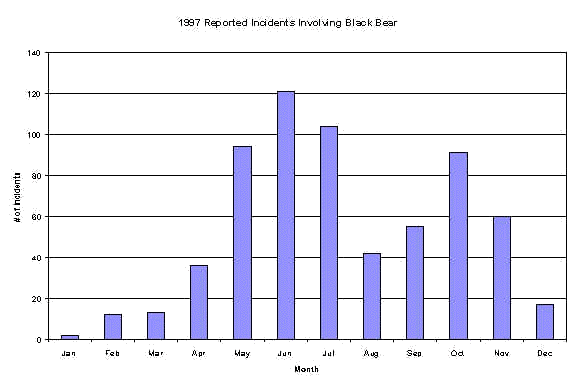
March 16, 1998
For more information contact:
Patricia McConnell at 908-735-7040
The New Jersey Department of Environmental Protection’s Division of Fish, Game and Wildlife cautions residents of Sussex, Warren, Morris and Passaic counties to avoid feeding black bears and to "bear proof" their surroundings this spring.
"Black bear-related incidents have increased dramatically over the past several years in the northern portion of the state and will most likely continue to escalate as the spring and summer months approach," said Division Director Bob McDowell. "During this time, bears become more mobile with activity levels increasing through the June breeding season, so residents of ‘bear country’ must take every precaution in bear-proofing their surroundings to avoid any negative encounters."
"Increased development in the northern portion of the state coupled with the desire of many New Jerseyans to enjoy the pristine beauty of the area through camping, hiking and other recreational pursuits this spring, will place bears and humans in closer contact than ever before," said Fish and Game Council Chairman Charles Suk. "With the bear population and human density of North Jersey at an all-time high, it’s quite possible that public complaints, concerns and actual damage caused by bears may exceed the Division and Council’s ability to handle the problem this spring. As a result, it is critical that local residents play an active role in helping to control black bear-related incidents in this part of the state by following some guidelines."
In New Jersey, black bear incidents have risen from 290 in 1995 to an all-time high of 647 in 1997. During that time (1997), 39 bears were struck by vehicles and 59 attempted or actually entered homes. In addition, bears were responsible for an estimated $110,000 in property damage, 52 livestock kills or injuries, and the charging or stalking of 23 people.
Banning the intentional or unintentional feeding of black bears is the most important step to bear-proofing one’s surroundings. Though individuals may mean well by providing hand-outs, establishing artificial feeding sources and the association of humans with food inevitably creates problems for both the bears and the people involved. A bear that becomes accustomed to finding food in someone’s yard will return to that yard and the yards of neighbors until it gradually loses its natural instinct to avoid people.
Since black bears have the distinction of eating almost anything, scavenging from garbage cans, bird feeders and campsites can become a common occurrence once an area has been established as a "reliable" food source. As a result, such situations can mean damage or potential harm to homeowners and their property, as well as that of other families in the community.
To help avoid potential bear-human conflicts, proper sanitation techniques have proven to be the most effective method of preventing black bear damage. Following are some helpful "bear-proofing" hints.
Garbage should be stored in airtight containers and placed in a secure area. Containers should not be stored in a wooden shed or against garage or basement doors and should be washed with a disinfectant at least once a week to remove odors.
The outside feeding of dogs and cats should be done during daylight hours and all uneaten food and scraps, as well as food bowls, should be removed immediately after feeding.
Those who feed wild birds are urged to modify their feeding practices in accordance with the following guidelines. As bird seed and suet are highly attractive to black bears, feeders should be suspended from a free hanging wire during daylight hours only, so that the bottom of the feeder is at least eight feet off the ground.
Should you see a black bear, do not approach it under any circumstances. Sightings may be reported to the Division’s Wildlife Research Section at 908-735-7040. Individuals needing assistance in controlling bear damage may contact the Division’s Wildlife Control Unit at 908-735-8793.
New Jersey has a growing black bear population currently estimated between 450 and 550 animals concentrated mostly in Sussex, Warren, western Morris and northern
Passaic counties and which is projected to double over the next five to ten years. However, bear-related incidences are occurring more frequently in other counties, particularly Hunterdon and Somerset as the black bear population expands.
"Residents in these areas need to realize that bears are a natural part of the forest environment," McDowell said. "In a state as densely populated as our own, this means that bears are never far from residential areas and people. However, they usually avoid or only pass through such populated areas in search of their natural woodland food sources. Therefore, it is essential that they not have their regular travel and behavior patterns altered by intentional or unintentional feeding."
Black bears are currently protected in New Jersey and it is illegal to harm them in any way.
